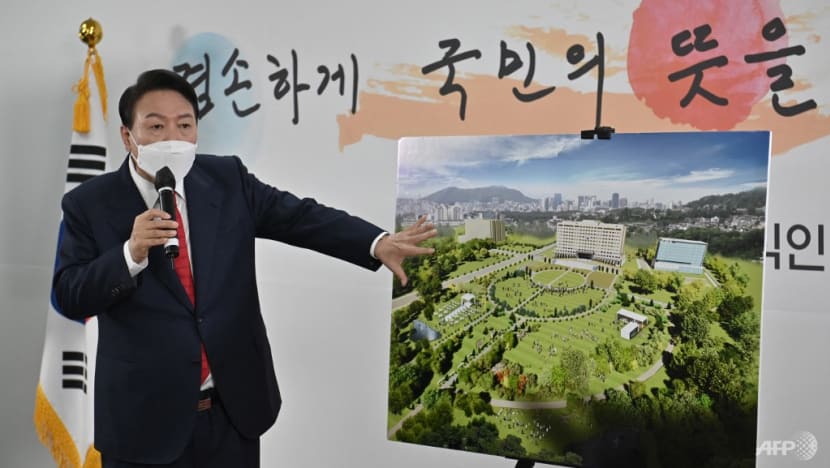South Korea President Yoon's Blue House move to reshape Seoul

South Korea's president-elect Yoon Suk-yeol shows a bird's eye view of his planned relocation of the presidential office during a press conference at his transition team office in Seoul on Mar 20, 2022. (Photo: AFP/Jung Yeon-Je/Pool)
The decision by South Korea’s incoming leader to move the presidential office away from its current address in the north of Seoul to an underdeveloped neighbourhood best known for its US military presence could significantly reshape the 600-year-old capital politically and economically.
President-elect Yoon Suk-yeol, who beat out the ruling-party candidate in a closely fought election in March and who will be sworn in on Tuesday (May 10), vowed not to step into the current presidential office known as the Blue House, named for the 150,000 hand-made blue tiles that adorn its roof.
He plans to move his office instead to a Defense Ministry complex in Yongsan district about 5km south, and open the Blue House to the public.
The move would shift the center of power to one of the city's largest districts, where redevelopment has been in fits and starts for two decades due to massive costs and opposition from local residents. It would also take the president out of the central Seoul location that had been the seat of government for six centuries as monumental historical events unfolded around it.
Yoon comes to power as a conservative former prosecutor whose victory marks a hawkish turn in South Korean politics.
He has blasted the Blue House as a “symbol of imperial power” and defended the relocation as a move that presents a more democratic presidency to the public, while also citing security and logistical reasons for moving: the Defense Ministry building houses a military bunker.
The Blue House complex sits in the northern part of Seoul in the Washington DC-like Jongno district, occupying an area of about 250,000 sq m nestled behind Gyeongbuk Palace. Nearby is the Gwanghwamun Square, the historical locus of mass protests in South Korea including those that brought an end to military dictatorship in the 1980s.
It is also flanked by mountains, which makes it a natural fortress against potential North Korean artillery attacks—even though the regime has still attempted to breach the grounds. In 1968, North Korean commandos disguised as South Koreans climbed those mountains and raided the complex in a foiled attempt to kill then-President Park Chung-hee.
Meanwhile, Yongsan had long been a popular stationing site for foreign troops due to its vantage point over downtown Seoul and its proximity to the Han river. It had been a supply base for invading Japanese samurai in the 16th century, and then home to the Japanese colonial army in the early 20th century.
US forces had been stationed there almost continuously since the end of World War II, but are now in the midst of moving out of the capital.
The new presidential office is a 10-storey building in a larger complex of about 270,000 sq m that also houses various military agencies such as the Joint Chiefs of Staff.
Yoon’s office has launched a survey allowing the public to submit ideas to name the building, and the chosen entry will win 6 million won (US$4,800). Yoon has said that in the interim he will call the building "People’s House".
Related:
Economically, shifting the center of South Korean political power to Yongsan accelerates the redevelopment of what had long been a neglected part of Seoul, and would create a new center for the capital.
Its gentrification was led by cosmetics giant AmorePacific, which opened its new headquarters there in 2017. A large former brothel that had long symbolized Yongsan’s backwardness was razed in 2009.
"The concept here is 'If you build it, they will come,' and having the presidential office in an underdeveloped area will certainly make a statement," said Konstantinos Tsavdaridis, professor of structural engineering at City, University of London.
However, many South Koreans are unhappy with the move to Yongsan. A recent poll showed slightly more than half of South Koreans want Yoon to reconsider the decision while about 40 per cent backed it. Outgoing President Moon Jae-in has also expressed unease, saying the move would hurt combat readiness by forcing the top military agencies to move.
Kang In-sun, a spokeswoman for Yoon, did not respond to a request for comment.
Yoon takes office with some of the lowest approval ratings of any democratically elected South Korean president, in a country where the electorate is deeply divided.
He also comes into power with the memory of how mass demonstrations in Jongno plagued his two conservative predecessors, including Park Geun-hye, who was ultimately impeached in 2017 over an influence-peddling scandal.
As such, some local media outlets have speculated that a physical move away from Gwanghwamun could put some distance between the president and the inevitable protests that will ensue during his presidency.
But it is unlikely that Yoon will be able to avoid the masses altogether, said Hong Sung-gul, professor at Kookmin University's Department of Public Administration, who believes protests may continue in Yongsan once the US base moves away and creates more public space.
The first real challenge of the efficacy of the new Yongsan compound, however, will come very soon after Yoon takes power, with a planned visit by US President Joe Biden later this month. The Blue House has often been the setting for such high-level diplomatic functions for decades, and officials are well-versed on matching its layout to the protocols needed for such formalities.
The Blue House "may become a major tourist attraction once it opens up and provide a fillip for Yoon’s rating in the short term," said Shin Yul, a political science professor at Myongji University. "But the real test for him is how the economy will do in the long run. He needs to show he’s capable of progress beyond political spectacles."













